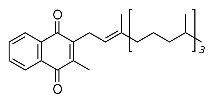Vitamin K Benefits for Antiaging and Wellness
Vitamin k benefits for antiaging are surprisingly important. Vitamin k deficiency can have serious health consequences than those of other nutrients. Sources of vitamin k should be included in your diet for optimal health.
The Forgotten Vitamin
We generally hear a lot about the superstars of the vitamin world like vitamin c, e, and d, but rarely do we see vitamin k benefits make the headlines. Come to find out this nutrient is a very powerful antioxidant that is critical to so many functions that deficiencies can be life threatening.

What we call vitamin k has two natural forms:
Vitamin K1 (phylloquinone).
Vitamin K2 (menaquinone).
They are fat soluble vitamins with the following vitamin k benefits:
- Preventing calcification of coronary arteries
- Important for preventing osteoporosis by regulating calcium
- Diets high in vitamin k may help prevent stroke
- Inhibits the inflammatory cytokine IL6
- Sufficient levels are important for preventing Alzheimer’s disease
- Necessary for proper blood sugar regulation
- More powerful an antioxidant than vitamin e or coenzyme q10
- Protects the liver from free radicals
- Possibly protective against some forms of cancer
- Keeps calcium in bones and prevents calcium from being deposited in other tissues
Vitamin K Deficiency
Vitamin k deficiency was thought to be rare, and it may be in a strictly clinical sense. However as we've seen before sub clinical deficiency of this vitamin may be widespread.
There is a huge difference between deficiency that causes outright disease, and lower than optimal amounts of a vitamin that can result in long term problems that develop over time and cause chronic disease.
Some of the signs of vitamin k deficiency are:
- Nosebleeds
- Bleeding Gums
- Heavy menstrual bleeding
- Eye hemorages
- Prolonged clotting times
- Osteoporosis
- Ostepoenia
- Anemia
- Easy bruising
- Hypercaliciuria
- Liver cancer
- Calcification of soft tissue
RDA's for vitamin k are:
80mg/day for adult males, 65mg/day for adult women, 5mb/day for infants.
People that are on anticoagulants like Warfarin or Coumadin are advised to avoid sources of vitamin k and therefore will be deficient in this vitamin. This can lead to serious health problems and so should be monitored by a doctor of other health professional.
The most common way of testing for deficiency is to use the protein prothrombin as an indicator. This test is called “pro time” for short. This is usually monitored in people who are on so called “blood thinning” medications.

Even though vitamin k is a fat soluble vitamin, it is not stored in the body and is not known to be toxic even at high levels.
Sources of Vitamin K
Food sources of vitamin k are:
- Lettuce, Swiss chard, kale, cauliflower, broccoli, spinach, Brussels sprouts
- Tomato
- Avocado, kiwi fruit
Vitamin k is much better absorbed when there is fat in the meal, and this makes a good argument for a nice salad with extra virgin olive oil!
It is also available in supplement form and my preference is Life Extension brand, Jarrow Formulas, Metagenics, ect. From online sources like Webvitamins or Vitamin Shoppe.
The very latest research indicates that vitamin k benefits go beyond just preventing vitamin k deficiency, and can actually improve health across the board with levels well above the RDA.
Return from Vitamin K Benefits to Antiaging Nutritional Supplement
Return to Home Page
New! Comments
Care to comment? Feel free to leave your comments below!